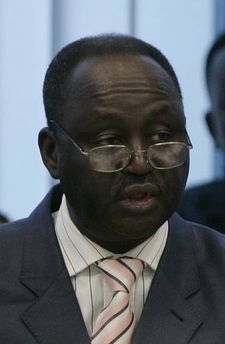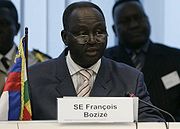François Bozizé
| François Bozizé | |
 |
|
|
|
|
|---|---|
| Incumbent | |
| Assumed office 15 March 2003 |
|
| Prime Minister | Abel Goumba Célestin Gaombalet Élie Doté Faustin-Archange Touadéra |
| Vice President | Abel Goumba |
| Preceded by | Ange-Félix Patassé |
|
|
|
| Born | 14 October 1946 Mouila, Gabon |
| Political party | Independent |
| Spouse(s) | Monique Bozizé |
| Religion | Pentecostal[1] |
François Bozizé Yangouvonda (born October 14, 1946) is the President of the Central African Republic. He came to power in March 2003 after leading a rebellion against President Ange-Félix Patassé and ushered in a transitional period of government. He won the country's 2005 presidential election; he received the most votes in the first round in March 2005, but less than a majority, requiring a runoff election, which he won in May 2005.
Contents |
Early life and Kolingba's rule
Bozizé was born in Gabon, a member of the Gbaya people, and attended a military officers' training college in the Central African province of Bouar.[2] He became a second lieutenant in 1969 and a captain in 1975.[2] He was appointed Brigadier General[2] by Emperor Jean-Bédel Bokassa in 1978, after he beat a French noncommissioned officer who had disrespected the president.[3][4] With General Josyhat Mayomokala, Bozizé ordered military personnel to attack young demonstrators who were asking for their parents' arrears.[5] After Bokassa was ousted by David Dacko in 1979, Bozizé was appointed Minister of Defense.[2] Following Dacko's ouster by André Kolingba in September 1981, Bozizé was appointed Minister of Communications, but fled to the north of the country with 100 soldiers after his involvement in a failed coup attempt led by Ange-Félix Patassé on 3 March 1982,[6] in which he accused Kolingba of treason and proclaimed the change of power on Radio Bangui.[7] He then obtained refuge in France.[8] Bozizé was arrested in Cotonou, Benin in July 1989, and imprisoned and tortured. He was put on trial by Kolingba on charges of helping the coup d'état in May but was acquitted on 24 September 1991 and released from prison on 1 December.[2][9] He then sought refuge in France,[4] where he remained for nearly two years.
Under pressure to democratize the government during the 1980s, Andre Kolingba had formed a political party and held a referendum, in which he was elected to a six-year term in office as president. After the fall of the Berlin Wall, internal and external pressures eventually forced Kolingba to adopt an even more democratic approach. In March 1991, he agreed to share power with Edouard Frank, who he named prime minister. He also established a commission to revise the constitution in order to promote pluralism. When he was pressured by the international community, notably a very vocal US ambassador to the Central African Republic, Daniel H. Simpson, to hold fair elections, assisted by the UN Electoral Assistance Unit and monitored by international observers in 1992, he only won 10% of the vote and so he declared the elections invalid and had the Constitutional Council cancel the election. He rescheduled the election for September 1993.[10] In the 1993 election, Bozizé ran for the presidency as an independent, receiving 12,159 votes, 1.5% of the total votes cast.[11] Patassé, Abel Goumba and Kolingba received 37.32%, 21.68% and 12.10% of the vote, respectively, but since none of the candidates obtained a majority, a run-off election between the top two candidates—Patassé and Goumba—was held. Patassé defeated Goumba by a 53.49%–46.51% vote and was elected president of the Central African Republic.[12][13]
Supporting Patassé
For many years Bozizé was considered a supporter of Patassé and helped him suppress army mutinies in 1996 and 1997. Bozizé was named the Armed Forces Chief of Staff.
Bozizé showed no activity against Patassé and frequently crushed revolts against the president.
Against Patassé
On May 28, 2001, a coup was attempted against Patassé[14] and defeated with the help of Libyan troops and Congolese rebels of the Movement for the Liberation of Congo.[15] Afterwards, Bozizé's loyalty was questioned, and in late October 2001 he was dismissed as army chief of staff. Fighting erupted when the government tried to arrest Bozizé on November 3; after five days of this, government forces aided by Libyan troops captured the barracks where Bozizé was based,[16] and Bozizé fled north to Chad.[17][18]
Fighting between government forces and Bozizé's rebels continued during 2002. From October 25 to October 31, his forces unsuccessfully attacked on the capital, Bangui; the Congolese MLC, who again came to Patassé's aid, were accused of looting and rape.[19]
This period was marked by tensions between Chad and Patassé's government. Patassé's ruling party accused Chadian president Idriss Déby of destabilizing the Central African Republic by supporting Bozizé with men and equipment.[20]
Capture of Bangui, transition period, and presidential election

On March 15, 2003, Bozizé finally succeeded in seizing power, with his forces entering Bangui unopposed. Patassé was returning from a meeting in Niger at the time, but could not land because Bozizé's forces controlled the airport.[21] Patassé took refuge in Cameroon and then Togo the next year.
Bozizé appointed Abel Goumba as Prime Minister soon after seizing power in March,[22] later making him vice-president in December and appointing Célestin Gaombalet in his place as prime minister.[23] Bozizé also suspended the country's 1995 constitution after seizing power, and a new constitution, reportedly similar to the old one, was approved by voters in a referendum on December 5, 2004.[24] After seizing power, Bozizé initially said he would not run in a planned future presidential election, but after the successful constitutional referendum, he announced his intention to stand as a candidate on December 11:
- After thinking thoroughly, and being deeply convinced and keeping in mind the nation's interest, I grasped the deep sense of my people's calls. As a citizen, I'll take my responsibility.
- I'll contest the election to achieve the task of rebuilding the country, which is dear to me and according to your wish.[2]
On December 30, 2004, Bozizé was one of five candidates approved to run in the presidential election scheduled for early 2005.[25] On January 4, 2005, Bozizé announced that three initially excluded candidates would also be allowed to run, although former president Patassé was not included in either group.[26] In late January, it was announced that more candidates would be permitted to run in the election, bringing the total to 11 and leaving only Patassé barred. The elections were also delayed by one month from the previously scheduled date of February 13 to March 13.[27]
Bozizé placed first in the March 13 election, taking just under 43% of the vote according to official results.[28] He faced Patassé's last prime minister, Martin Ziguélé, in a second round of voting; this was held on May 8 and according to official results announced on May 24, he won with 64.6% of the vote.[29] He was sworn in on June 11.[30]
The National Assembly authorized Bozizé to rule by decree for three months, from January 1 to March 31, 2006; his Prime Minister, Élie Doté, said that this period of rule by decree was successful, enabling Bozizé to take measures to streamline the civil service.[31]
In addition to being President, Bozizé has been Minister of National Defense since taking power. At the end of the transitional period, he retained the defense portfolio when he appointed a new government under Doté in June 2005,[32] and he also kept it in a September 2006 cabinet reshuffle.[33]
Facing a general strike over wage arrears for civil servants in January 2008,[34] Bozizé appointed a new government headed by Faustin-Archange Touadéra, an academic figure who was politically unknown. In that government he kept the defense portfolio, while also appointing his son Francis Bozizé to work under him as Minister-Delegate. Bozizé's sister, Yvonne M'Boïssona, who had been Minister of Tourism, was reappointed to the government as Minister of Water, Forests, Hunting, Fishing, and the Environment.[34][35]
In February 2010, Kolingba died in France. In early March, Bozizé presided over his burial ceremony in Bangui. The same week, Bozizé signed a presidential decree setting the date for the next presidential election as 25 April 2010. [36]
Notes
- ↑ "Bozizé, François - MSN Encarta". Archived from the original on 2009-10-31. http://www.webcitation.org/5kwcPSamf.
- ↑ 2.0 2.1 2.2 2.3 2.4 2.5 "Bozize to contest presidency as an independent candidate", IRIN, 13 December 2004, http://www.irinnews.org/Report.aspx?ReportId=52396, retrieved 14 August 2008.
- ↑ Titley 1997, p. 44.
- ↑ 4.0 4.1 Kalck 2005, p. 33.
- ↑ Kalck 2005, p. 7.
- ↑ Kalck 2005, p. 8.
- ↑ Kalck 2005, p. xxxix.
- ↑ Kalck 2005, p. xl.
- ↑ http://books.google.com/books?id=3D4xFUTrOycC&pg=PA1049&lpg=PA1049&dq=bozize+trial&source=web&ots=zYdaVoS38W&sig=HsWkcrKY66hW4Z6JKv_NueglgiI&hl=en&sa=X&oi=book_result&resnum=8&ct=result
- ↑ Appiah & Gates 1999, p. 1502.
- ↑ (French) (PDF) Rapport de la Mission Exploratoire en vue des Elections Presidentielles et Legislatives du 22 aout 1993, Le Conseil Permanent de la Francophonie, http://democratie.francophonie.org/IMG/pdf/RAPPORT_DE_LA_MISSION_EXPLORATOIRE_EN_VUE_DES_ELECTIONS_PRESIDENTIELLES_ET_LEGISLATIVES_DU_22_AOUT_1993.pdf, retrieved 15 August 2008.
- ↑ Central African Republic: parliamentary elections Assemblée nationale, 1993, Inter-Parliamentary Union, 11 January 2007, http://www.ipu.org/parline-e/reports/arc/2059_93.htm, retrieved 2008-08-15.
- ↑ Diamond, Larry (April 2002), "Election Results in Hybrid Regimes, 1989-2001", Journal of Democracy 13 (2): Appendix 2, ISSN 1045-5736, http://www.journalofdemocracy.org/articles/gratis/diamond2.htm.
- ↑ "Situation “confused” after apparent coup attempt", IRIN, May 28, 2001.
- ↑ "Patasse government back in control", IRIN, June 4, 2001.
- ↑ "Rebel general, overpowered, flees", IRIN, November 8, 2001.
- ↑ "Regional efforts underway to calm tensions", IRIN, November 28, 2001.
- ↑ Mehler 2005, p. 146.
- ↑ "UN to investigate October rights abuses", IRIN, November 11, 2002.
- ↑ "Ruling party accuses Chad of backing coup attempt", IRIN, November 5, 2002.
- ↑ "Rebel leader seizes power, suspends constitution", IRIN, March 17, 2003.
- ↑ "Bozize appoints prime minister", IRIN, March 24, 2003.
- ↑ "New premier forms government, Goumba appointed VP", IRIN, December 15, 2003.
- ↑ "New constitution adopted, 15 to vie for presidency", IRIN, December 20, 2004.
- ↑ "Court clears five to run for president", IRIN, December 31, 2004.
- ↑ "Bozize repeals court ban on some presidential candidates", IRIN, January 5, 2005.
- ↑ "Election postponed, but most banned candidates can now run", IRIN, January 25, 2005.
- ↑ "Two to face off in second round of presidential poll", IRIN, April 1, 2005.
- ↑ "Incumbent wins presidency", IRIN, May 24, 2005.
- ↑ "Central Africa Gets Chief", Agence France-Presse, June 11, 2005.
- ↑ "Prime minister declares rule by decree a success", IRIN, June 9, 2006.
- ↑ "Newly-appointed premier names cabinet", IRIN, June 21, 2005.
- ↑ "Nouveau gouvernement", fodem.org, September 3, 2006 (French).
- ↑ 34.0 34.1 "Central African leader names son in new government", Reuters (AlertNet), January 28, 2008.
- ↑ "Composition du nouveau gouvernement centrafricain", African Press Agency, 29 January 2008.
- ↑ http://af.reuters.com/article/topNews/idAFJOE61O0OQ20100225
References
- Reference:
- Jean-Marc Aractingi,La Politique à mes trousses( Politics at my heels), Editions l'Harmattan, Paris, 2006, Central Africa Chapter (ISBN 978-2-296-004696).
- Appiah, K. Anthony; Gates, Henry Louis, Jr., eds. (1999), Africana: The Encyclopedia of the African and African American Experience (1st ed.), New York: Basic Books, ISBN 0-465-00071-1, OCLC 41649745.
- Kalck, Pierre (2005), Historical Dictionary of the Central African Republic (3rd English ed.), Lanham, Maryland: The Scarecrow Press, ISBN 0-8108-4913-5.
- Mehler, Andreas (2005), "The Shaky Foundations, Adverse Circumstances, and Limited Achievements of Democratic Transition in the Central African Republic", in Villalón, Leonardo Alfonso; VonDoepp, Peter, The Fate of Africa's Democratic Experiments: Elites and Institutions, Bloomington, Indiana: Indiana University Press, pp. 126–152, ISBN 0-253-34575-8, OCLC 57414663.
- Titley, Brian (1997), Dark Age: The Political Odyssey of Emperor Bokassa, Montreal: McGill-Queen's University Press, ISBN 0-7735-1602-6.
| Political offices | ||
|---|---|---|
| Preceded by Ange-Félix Patassé |
President of Central African Republic 2003–present |
Incumbent |
|
|||||